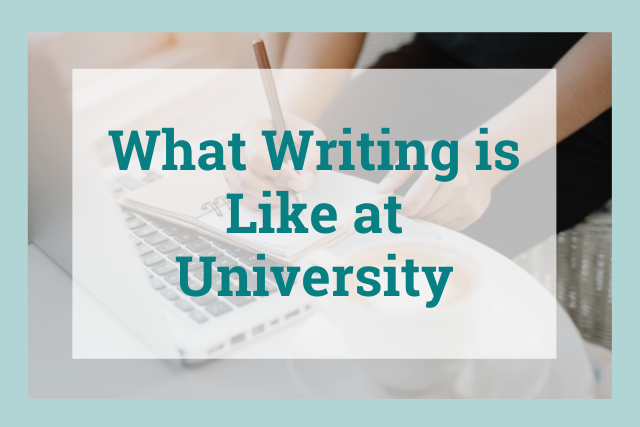
So, you started university last week and have just received your first assignment. What now?
University can be really daunting if you don’t know what to expect—it’s nothing like school, and it’s nothing like work. It’s an in-between world where young adults learn to find their feet living away from home for the first time.
This article will outline how school differs from university, the best practices for essay writing, and how to make your transition to university as smooth as possible.
How is Writing at University Different from Writing at High School?
The primary difference between writing at university versus writing at school is that at university you have to write academically.
Academic writing is clear, concise, and clearly structured; it is also strongly backed by evidence. The purpose of it is to aid the reader's understanding of a particular topic or theme.
Referencing, Referencing, and More Referencing
In order to add evidence, you must reference where you got it from. Gone are the days when you could make a sweeping statement and receive good marks for it. University is a time to build on the canon of arguments and observations made before you by academics. Wave goodbye to Wikipedia—it is not, nor will it ever be, a good source of information.
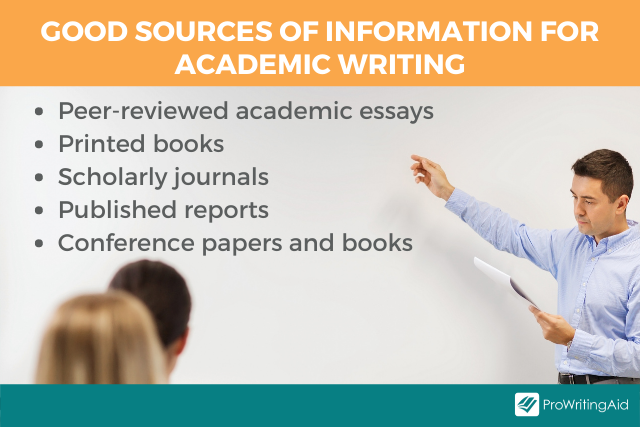
You Are in Control
Another big difference is how much freedom university students have. There is no teacher breathing down your neck checking that you are progressing with your work.
In fact, it is common that the first time your lecturer sees your essay is when they are giving it a final mark. All this means that you have to be on top of your work and ensure that you are producing the best work that you can in the correct time frame.
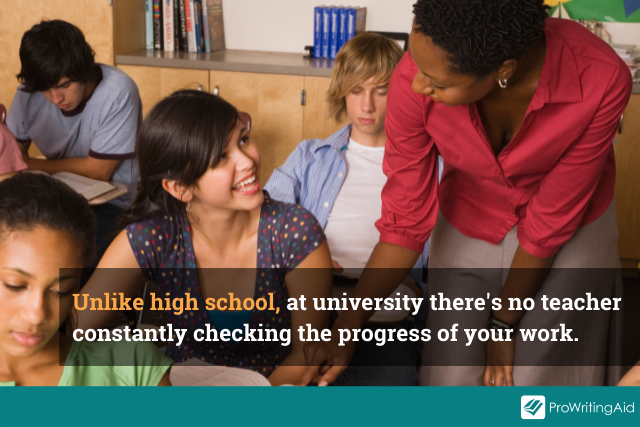
How Does Learning Work at University?
Education at university takes place in four forms: lectures, seminars, labs, and independent learning—the latter of which take up 90% of a student's time. In high school you would have six hours a day of lessons, plus one hour a day of independent learning (more often than not in the form of homework).
University is the opposite, you may only receive ten hours a week of lectures and seminars. Alongside this you may be expected to do as many as 40 hours of independent learning weekly.
What Are Lectures?
Lectures usually involve your entire course, which could easily exceed 200 students. They will take place in large lecture theaters with a single lecturer at the front. The lecturer will present for an hour or two, and there is hardly any chance to ask questions or discuss topics.
What Are Seminars?
Seminars are the partner to lectures. They involve much smaller groups of up to about 20 students, but they can be as small as 4 or 5. They are your chance to discuss, ask questions, and delve deeper into the nitty gritty of your topic.
What Are Labs?
If you are studying a STEM (Science, Technology, Engineering, and Mathematics) topic then you may also have labs. They can involve everything from a two-day chemical experiment to a hands-on project.
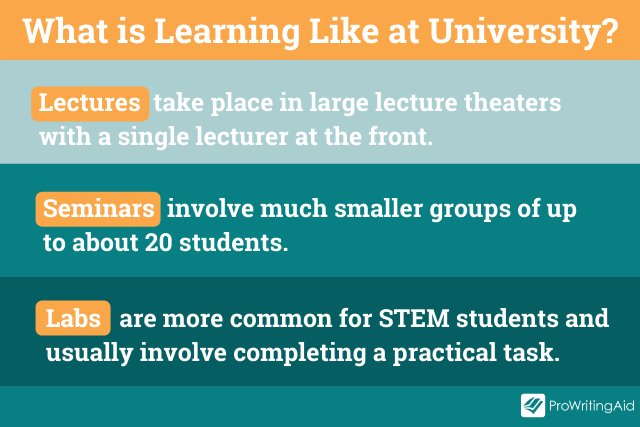
How is Work Graded at University?
Different institutions have slightly different classifications but here are the basic grading systems you will encounter in American and British Universities.
American University’s Grading System
In America, the grading system is fairly consistent throughout all the stages of education. There are two primary ways to receive a grade, either as a letter (the highest being an A) or a GPA (the highest being a 4.0).
- 90%- 100% = A or 4.0 GPA
- 80%- 90% = B or 3.0 GPA
- 70%- 80% = C or 2.0 GPA
- 60%- 70% = D or 1.0 GPA
- < 59% = Fail
British University’s Grading System
In Britain, unlike in America, the university grading system is completely different to the school grading system. There are five rankings: a 1st, a 2:1, a 2:2, a 3rd, and a fail. To put that into context:
- 70%- 100% = 1st
- 60%- 69% = 2:1
- 50%- 59% = 2:2
- 40%- 49% = 3rd
- < 40% = Fail
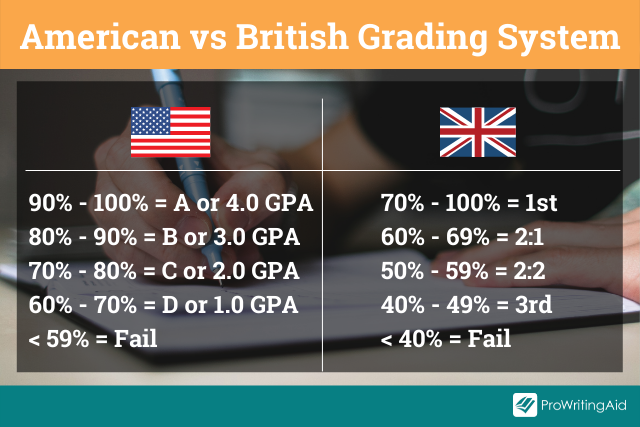
What is Referencing?
When you are writing and use someone else’s ideas, you must acknowledge and reference them. If you don't reference correctly, then it will count as plagiarism.
Plagiarism is when someone takes someone else’s work and pretends that it is their own. If an essay contains plagiarism, it can be disqualified, essentially being awarded a mark of zero, even if the plagiarism is unintentional. To ensure that this does not happen to your work, it is essential to reference correctly.
This might be your first time hearing about plagiarism but rest assured, there are tools to help. Grammar checkers like ProWritingAid offer plagiarism checks that allow you to check your work against over a billion web-pages, published works, and academic papers to be sure of its originality.
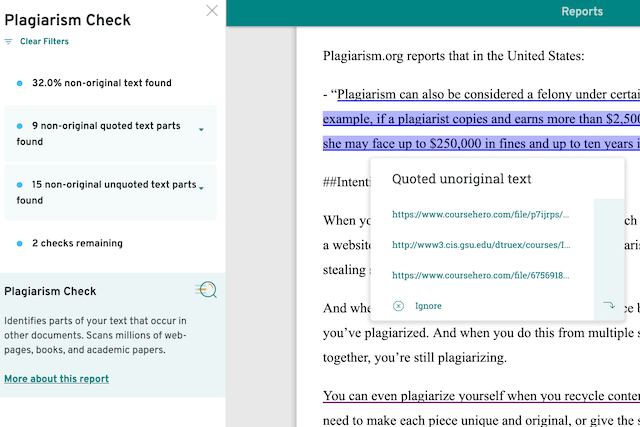
Sign up for a free ProWritingAid account to get started.
There are two primary ways to reference: in-text citations and end-of-text citations in a bibliography at the end of your paper. Not all subjects will use both methods, but they will all use one.
In-text Citations
In-text citations provide a shortened reference within the body of the text. These must be used when you refer to, summarize, paraphrase, or quote from another source.
For example:
- H. G. Wells highlighted the mendacity of men by noting “an animal may be ferocious and cunning enough, but it takes a real man to tell a lie” (Wells, 2017, p.98).
Bibliography
A bibliography is a list of all works used within a piece of scholarly work, typically listed at the end. The fundamental difference between a bibliography and in-text citations is that a bibliography contains all sources that a person used in research or writing, regardless of whether they are explicitly referenced or not.
Here's what an entry in your bibliography might look like:
- Wells, H. G., 2017. The Island of Doctor Moreau and Other Stories. Hertfordshire: Wordsworth Editions Limited, p.98.
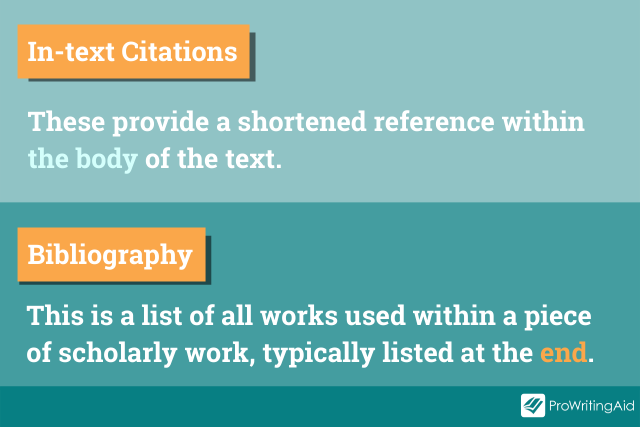
Referencing Systems
There are four main referencing systems:
- Modern Languages Association (MLA)
- American Psychological Association System (APA)
- Harvard System
- Modern Humanities Research Association System (MHRS)
Each system has a distinct set of rules that can take years to fully understand. Lucky for you, unless you are minoring in a totally different subject to your major, you should only need to learn one of them.
Why You Shouldn't Use Referencing Tools
The internet has a solution for everything and referencing is no different. There are various tools that claim to accurately generate citations for any source for every referencing system.
The problem is that some people rely on them and therefore do not understand how to reference without them. When the tool inevitably makes a mistake, these people don't notice and then lose marks on their submitted essays. My advice is to use them as supporting technology rather than a primary source.
Now you know about lectures, grading systems, and referencing, let’s have a look at some best practices for essay writing.
How Do You Write a University Essay?
Although each subject will have slightly different guidelines on how to write a first-class essay, there are some basic rules that everyone should follow.
Do your Research
I was constantly reminded at university “the research should take longer than the writing” and it took around two years for me to believe it. It may feel like a waste of time, but doing research before you write can have some distinct benefits.
Even if you don’t come out with physical proof of your research, you will have concreted your knowledge on the topic and, in turn, will produce a better essay.
Most essay assignments will have a requirement to include references, so for this research is essential to hit the top-grade boundaries.
Through researching, you may encounter a new perspective you had not considered before. Examiners love reading fresh material, so this may be just the thing to gain you that coveted first-class degree.
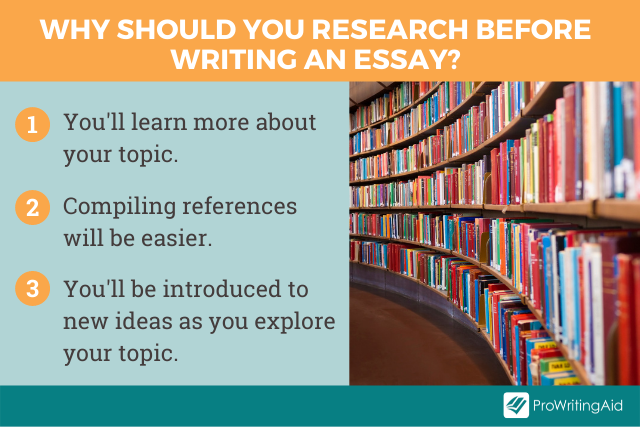
You should always have a detailed understanding of the essay topic before putting pen to paper (or fingers to keyboard).
Understand the Question
A great essay is no good if it does not answer the question, so make you sure you hone in on the action words in the question. An action word could be explain, describe, compare, or explore. Many top students have been tripped up by answering "what" instead of "explain".
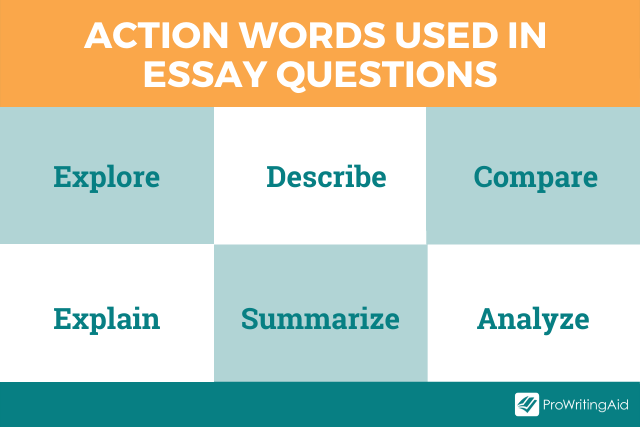
Plan, Plan, Plan
From high school to university, the importance of planning essays does not decrease.
A plan can help you to coherently express and structure your ideas in a consistent and logical way. Without a plan it is easy to stray from the question and become too “wordy”. With a plan you will lead the marker from relevant argument to relevant argument in a clean and concise way.
There is a reason teachers and lecturers alike are so enthusiastic about plans, they can turn a second-class essay into a first-class essay.
Check out this guide to creating a solid essay outline.
Write the Body of Your Essay
The body is the longest part of an essay. It is where you can lead your reader through each of your arguments, presenting all of your main points and evidence. Although each paragraph should have a distinct argument, there should be a logical line that connects them all. After all, you're writing a long essay and not a series of unconnected mini arguments.
Write the Introduction and the Conclusion
It is best to write your introduction and your conclusion after writing the body of the essay. This is because the finer points of your argument are likely to deviate from your initial plan so you can’t set out exactly what is going to be included in your essay until you have written it.
The conclusion is arguably the most important part of an essay. If you are struggling to write a conclusion, I would strongly recommend that you review your essay. If you cannot summarize a logical argument, then your reader cannot either.
The conclusion should not introduce new ideas but it also should not just repeat old ones. Instead, a conclusion should clarify and accentuate your argument for your reader (who is also most likely your examiner).
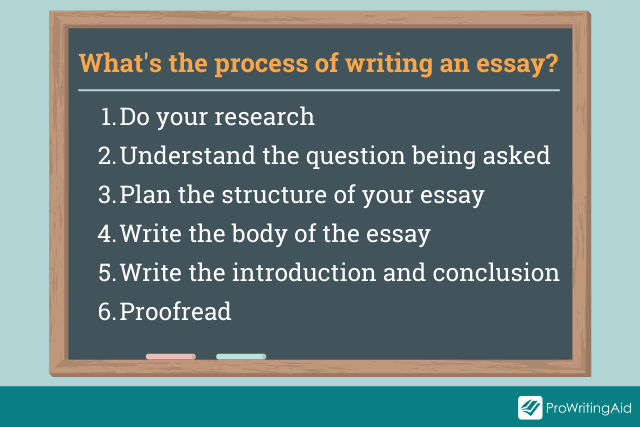
Proofread
Writing your essay is only half of the battle, the other half is proofreading. If you have time, and your essay is not due at midnight (we've all been there), put it aside and come back to it a few days later. Ask yourself these questions:
Have I answered the question?
Is my argument clear and logical?
Are my style and tone appropriate?
Have I included enough examples to back up my argument?
Is every paragraph relevant? (adding irrelevant paragraphs is not a good way to hit the word count)
Is my conclusion relevant? (Your conclusion should not parrot the body of the essay but bring a new insight)
Is everything referenced correctly?
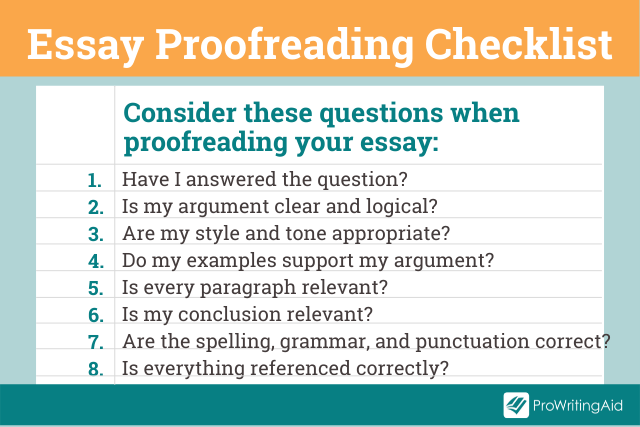
When you can answer yes to all eight of these questions, congratulations, your essay is ready to be submitted.
Want to improve your essay writing skills?
Use ProWritingAid!
Are your teachers always pulling you up on the same errors? Maybe you're losing clarity by writing overly long sentences or using the passive voice too much.
ProWritingAid helps you catch these issues in your essay before you submit it.



